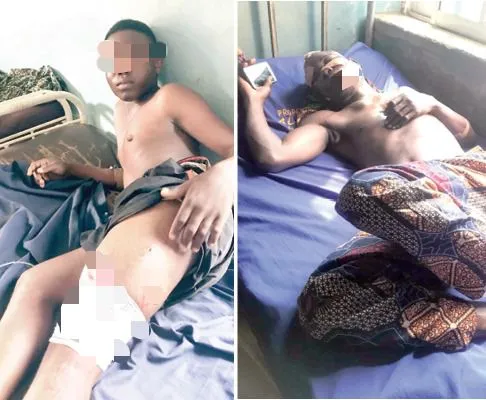A 13-year-old boy narrowly avoided death in an unsettling case of mistaken identity when he was shot by a night guard who mistook him for a robber. The terrifying incident occurred late on Monday night in the Wajawaja Community in Apete, Ibadan, when the young boy, Olaitan Tiamiyu, was traveling home with his father on a motorcycle.
Alhaji Monsuru Tiamiyu, Olaitan’s father, had been picking up his son from his mother’s shop when the shooting occurred. As the father and son navigated their way home on the dark and quiet Apete-Akufo Road, they suddenly found themselves under the glare of flashlight beams. It was a scene that would forever haunt the Tiamiyus.
Olaitan, a Junior Secondary School 3 student, recalled the fateful moments: “We live at Lamini Community. We were on our way back from my mother’s shop at Yidi. My father had decided against stopping at our second shop in Alapata since it was late. But as we moved along the road, flashlights from people standing on either side of the path caught our attention.”
Unsure of their intentions and suspecting that they were confronted by robbers, Tiamiyu sped up in an attempt to distance himself from what he believed was a potentially dangerous situation. The father’s instincts kicked in, urging him to get away as quickly as possible.
But before he could fully escape, a gunshot rang out into the night, sending a chilling wave through both father and son. “As we made a turn, I heard the sound of a gunshot. I felt a sharp pain in my leg and back. I saw blood flowing,” Olaitan said, his voice trembling with the memory.
The bullet struck the boy in his thigh and back, while his father was grazed by a bullet in the buttocks. The pain was overwhelming, and Olaitan’s leg went numb, causing him to collapse to the ground. In the chaos, the father frantically looked for the shooter, realizing the gravity of the situation.
As shock turned to anger, Tiamiyu turned around and confronted the night guard who had fired the shot. The guard, Mr. Akeem Babalola, 55, claimed that he had acted out of suspicion when he saw the motorcycle rider’s swift movement. “I thought he was a thief trying to escape,” Babalola explained. “I waved him down, but he didn’t stop. I thought he might be trying to escape with stolen goods, and I fired a shot at him.”
In the face of the terror that ensued, the boy’s father demanded that his son contact their relatives for help. With the boy’s life hanging in the balance, the distress call sent shockwaves through the neighborhood. Members of the community rushed to the scene, but the situation quickly turned violent.
Upon seeing the injured boy, members of the crowd erupted in anger, and the guard was swiftly overpowered. “They beat me with bottles and stabbed me in several places. I lost consciousness,” Babalola recalled, still visibly shaken by the attack. He was eventually taken to a private hospital for treatment.
The community member who witnessed the aftermath shared their account: “When the mob saw the boy bleeding, they attacked the night guard until he passed out. They were enraged, but it was clear the man had made a grave mistake.”
The boy’s injuries were serious but not life-threatening. After receiving initial treatment at a local doctor’s office, Olaitan was transferred to a hospital where the 11 pellets embedded in his body were surgically removed. His bandaged leg bore testament to the trauma he endured, with traces of blood still visible on the dressing.
When contacted by Nigerian Tribune, the Police Public Relations Officer for Oyo State, CSP Adewale Osifeso, confirmed the incident, stating that an investigation was already underway. “The police are looking into the matter, and we will provide further updates once the investigation is concluded,” Osifeso said.
The night guard, who also runs a concrete block business, maintained that he was simply trying to protect the community from what he perceived as a potential threat. However, his judgment was clouded by a rush of suspicion, which led to the catastrophic error.
Despite the guard’s defense, the case highlights the dangers of vigilantism and the tragic consequences that can arise from mistaken identity. Community members, law enforcement, and families alike have been left shaken by the incident, raising serious questions about safety, communication, and the risks posed by poorly regulated security personnel in Nigerian communities.
For the Tiamiyu family, the traumatic ordeal will be difficult to forget. “I still can’t believe it happened,” Olaitan’s father, Alhaji Monsuru, said. “I was just trying to protect my son, but we almost lost him.”

